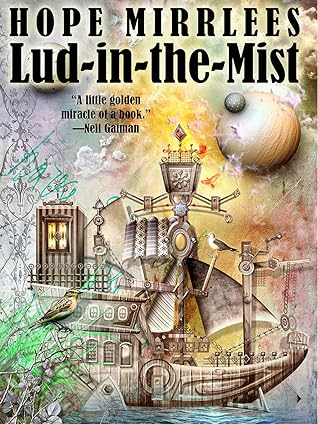More on this book
Community
Kindle Notes & Highlights
And this class had discovered—as it always does—that trade was seriously hampered by a ruler unchecked by a constitution, and by a ruthless, privileged class.
In the eye of the law, neither Fairyland nor fairy things existed. But then, as Master Josiah had pointed out, the law plays fast and loose with reality—and no one really believes it.
“Reason I know, is only a drug, and, as such, its effects are never permanent. But, like the juice of the poppy, it often gives a temporary relief.”
The malady you suffer from should, I think, be called ‘life-sickness.’ You are, so to speak, a bad sailor, and the motion of life makes you brain-sick. There, beneath you, all round you, there surges and swells, and ebbs and flows, that great, ungovernable, ruthless element that we call life. And its motion gets into your blood, turns your head dizzy. Get your sea legs, Master Nathaniel! By which I do not mean you must cease feeling the motion ... go on feeling it, but learn to like it; or if not to like it, at any rate to bear it with firm legs and a steady head.”
And suddenly he saw her with the glamour on her that used to madden him in the days of his courtship, the glamour of something that is delicate, and shadowy, and far-away—the glamour that lets loose the lust of the body of a man for the soul of a woman.
Life has its sad side, and we must take the rough with the smooth. Why, maids have died on their marriage eve, or, what’s worse, bringing their first baby into the world, and the world’s wagged on all the same. Life’s sad enough, in all conscience, but there’s nothing to be frightened about in it or to turn one’s stomach. I was country-bred, and as my old granny used to say, ‘There’s no clock like the sun and no calendar like the stars.’
Pride and resentment are not indigenous to the human heart; and perhaps it is due to the gardener’s innate love of the exotic that we take such pains to make them thrive.
For he realized at last that the spiritual balm he had always found in silent things was simply the assurance that the passions and agonies of man were without meaning, roots, or duration—no more part of the permanent background of the world than the curls of blue smoke that from time to time were wafted through the valley from the autumn bonfires of weeds and rubbish, and that he could see winding like blue wraiths in and out of the foliage of the trees.
“And if all the gifts of Life are good, perhaps, too, are all the shapes she chooses to take, and which we cannot alter. The shape she has taken now for Dorimare is that of an invasion by our ancient foes. Why should we not make a virtue of necessity and throw our gates wide to them as friends?”
And this is but another proof that the Written Word is a Fairy, as mocking and elusive as Willy Wisp, speaking lying words to us in a feigned voice. So let all readers of books take warning! And with this final exhortation this book shall close.


